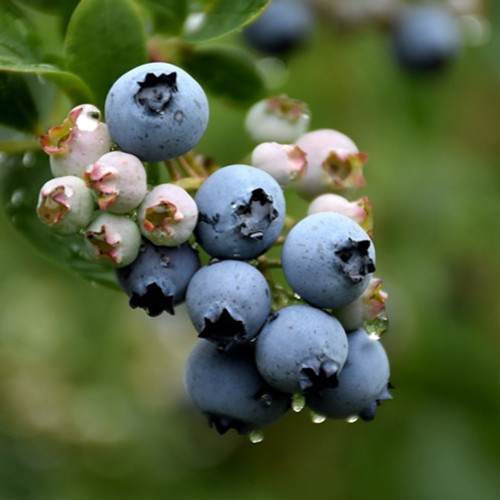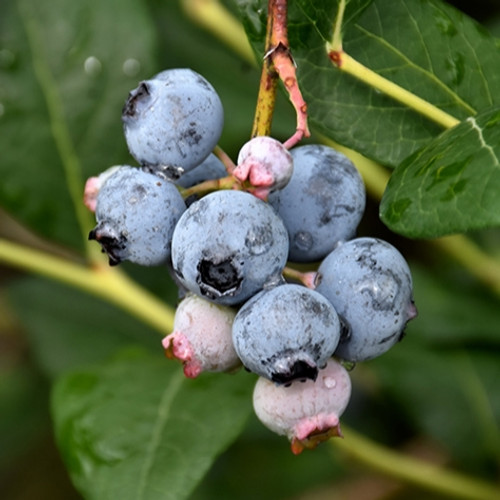| Vaccinium 'Northcountry' |
USDA Zone: 3-8 |
Northcountry Blueberry features dainty clusters of white bell-shaped flowers with shell pink overtones hanging below the branches in mid spring. It has green deciduous foliage. The glossy oval leaves turn an outstanding scarlet in the fall. It features an abundance of magnificent blue berries in mid summer.
Northcountry Blueberry is a small shrub that is commonly grown for its edible qualities. It produces clusters of blue round berries which are usually ready for picking in mid summer. The berries have a sweet taste and a juicy texture.
A hardy hybrid blueberry which forms a broad mounded shrub, excellent fall color, produces bumper crops of tasty sweet blue fruit in summer; all blueberries require highly acidic soils, excellent drainage and a good mulch, plant with plenty of peat moss
The berries are most often used in the following ways:
- Fresh Eating
- Cooking
- Baking
- Preserves
In many cases, you may want to plant pollinating partners to increase the size of your crops.
|
Key Feature
|
Light Needs | Landscape Uses |
 |
 |
|
|
|
|
| More About Northcountry Blueberry |
| Height: 2 ft |
Spread: 3 ft |
Flower Colour: White Shades |
|
Northcountry Blueberry is typically grown in a designated area of the yard because of its mature size and spread. It does best in full sun to partial shade. It does best in average to evenly moist conditions, but will not tolerate standing water. It is very fussy about its soil conditions and must have sandy, acidic soils to ensure success, and is subject to chlorosis (yellowing) of the foliage in alkaline soils. It is quite intolerant of urban pollution, therefore inner city or urban streetside plantings are best avoided, and will benefit from being planted in a relatively sheltered location. Consider applying a thick mulch around the root zone in winter to protect it in exposed locations Give them full sun in areas with mild summers. In hot summers, they'll appreciate some afternoon shade. Provide rich, acidic, well-drained soil. Shelter from harsh afternoon sun in very hot, arid climates. Water deeply and regularly. Before new growth begins in early spring feed with an acidic fertilizer, and prune away dead or non-fruiting wood to promote growth and berry production. If your soil is alkaline, you can amend your garden soil with some ACID LOVING PLANT & BERRY Soil Mix. Note that when grown in a container, it may not perform exactly as indicated on the tag - this is to be expected. Also note that when growing plants in outdoor containers and baskets, they may require more frequent waterings than they would in the yard or garden. Be aware that in our climate, most plants cannot be expected to survive the winter if left in containers outdoors, and this plant is no exception. NOTE: Some flowers and plants may be harmful or poisonous to people or pets if touched or ingested. If you require more information before placing an order, please let us know in advance. |










